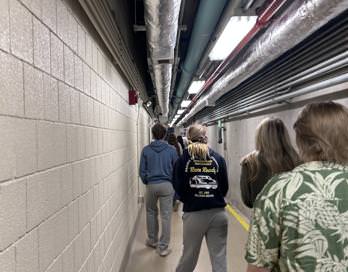Out of the 5 AP Science classes at this school, AP Biology, AP Chemistry, and AP Physics C are block scheduled, which means that the classes run for two consecutive periods. There are many reasons for why this is the case, but both students and teachers agree that this structure fits the class.
Block scheduling refers to a system where a class spans across two or more periods for the purposes of expanding knowledge and engagement. At LZHS, AP Biology, AP Chemistry, and AP Physics C all run on block scheduling. Anne Hopkins, AP Biology teacher, explains the main reason why the classes deserve block scheduling.
“The reason we were given double periods is because the College Board requires that we do a minimum of 13 designated labs. The labs cannot be completed in a 40 minute time frame, so that is initially why [administration] promoted [AP Biology] as a double period,” Hopkins said.
Even though other AP science classes, such as the AP Environmental Science cookie mining lab or AP Physics I pendulum lab, AP Biology’s labs warrant new and special circumstances.
“We do a lab where the students have to measure the rate of transpiration, which is [the] water vapor that is given off by leaves. [It is] a very slow process, so it takes almost an hour just to collect the data, because it moves very, very slowly,” Hopkins said. “You [could not] allow it to go overnight, because you [Would not] get a correct rate. [It is] not like we could set it up and come in the morning and collect data. It has to be collected over about [60 to 70] minutes.”
Although the mandatory labs warrant the block scheduling on their own, Hopkins highlights another benefit of block scheduling for AP Biology: since the class contains complex concepts, being able to cover more content with more class time ensures students receive adequate instruction.
“I think the content can be hard. I feel like [it is] in waves. What [we are] doing right now, I [do not] think is extremely hard. I will say this, that you have to put yourself on a schedule. You [cannot] be a procrastinator, [but] if you keep on schedule, [it is] very manageable. But if you are someone who procrastinates, I think it can become overwhelming,” Hopkins said.
AP Physics C’s schedule is deserved because on top of having mandatory labs, the class is designed to prepare students for two different exams: AP Physics C: Electricity and Magnetism and AP Physics C: Mechanics. This sets AP Physics C apart from the other blocked AP Classes.
Pranav Ram, senior, current AP Chemistry student, and former AP Biology student, agrees that the blocked schedules’ benefits extend past the required labs, and, perchance, make the workload more manageable and enjoyable.
“Well, [there is] a lot of course material in any AP class, but having two periods for [AP Chemistry] makes it so [there is] one, a little less homework and less self learning, but two, [there are] more chances to ask the teacher questions, more chances to get thorough notes,” Ram said.
However, according to Ram, block scheduling has one major downside: it interferes with students’ ability to take other important classes.
“I had to drop AP French this year because AP Chem was two periods,” Ram said. “Last year, I wanted to take [Genetics DC], but I [could not] take that because AP Biology was two periods. [We are] lucky to have a nine period day, because I know Stevenson has an eight period one.”

AP Biology, AP Chemistry, and AP Physics C were given blocked scheduling because of their mandated labs. Other AP classes offer similar amounts of material, but are only one period long. Criticism has been brought up by many teachers about that, maybe, a 40-minute period is too short.
“40 minutes, really, when you think about it, [is a low amount of] teaching time to get things done. [We] accommodate to match that 40 minutes, but sometimes, I wish for more time,” Hopkins said.
From a pedagogical point of view, blocked classes have nearly no downsides. Two periods have students learn a lot more, but Hopkins says that the class’s schedule introduces vital flexibility.
“I think [blocked scheduling] gives them more flexibility. If we [did not] have the double period, [they would] have to do more outside of class, and I think it would become more frustrating; […] I think they would lose understanding,” Hopkins said. “They [would not] make connections.”
Altogether, students undeniably have to put more thought into their scheduling if they want to take a blocked or two-period class. Since the class requires two consecutive periods, in a way, students have to build their entire schedule around taking AP Biology, AP Chemistry, or AP Physics C. Still, the rigor, college credit, and knowledge obtained make those classes worth it for many.
“[It is] really just about the benefits versus the costs, because you [have] got to think, do you really need this class? How much [will you] value it, and are you willing to give something up for it? If the answer is yes, then [you should] absolutely go for the double period classes, because [those classes] will help you a lot in the long run,” Ram said. “If you want to take courses for fun, you can take it at a lower level, or you can take some other science classes, like psychology, genetics, environmental science, physics, [and others].”




